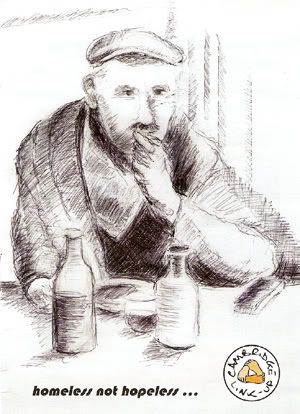
After finishing my shift in Cambridge the other day, I went to the launch of a new company. I enjoy going to entrepreneurial launches, I like the free grub.
Cambridge Link-up is a company that has been started by people who are homeless, who have been so in the past, or are vulnerably housed; it has its own board, bank-account and constitution.
It also has its own web-page, which includes information on organisations that can be contacted in time of crisis.
The Link-Up project started with a radio show called Homeless Truths on Cambridge's community station, 209radio, which can be heard in the Cambridge region on, confusingly, 105FM. It was and is a groundbreaking project, where homeless people would chat on-air with various individuals and bodies who might come into contact with them, the most famous, according to the Guardian (so it must be true), being a conversation with police officers.
It started as something for people to do - but sometimes something to do is the keystone to building a better life. Cambridge City Council tells us:
Research has shown that giving people an opportunity to
focus on regular activities, including work - offers a key route out of
homelessness. In addition engaging in occupation is seen as a central mechanism
of health (Wilcock, 1998). Studies have found that various types of activity
(including productive, educational, leisure, social and physical activities)
benefit health and wellbeing.
The citation is from a short document called "Journeys out of Loneliness" by Kim Wilcock. It was written for Help the Aged to look at ways of empowering homeless and formerly homeless older people to sustain a new way of living, but I think this short passage is worth looking at as pertaining to homeless people of any age:
"Lack of meaningful activity was a strong theme in interviews...Regular engagement in activity is vital for psychological well-being and quality of life...Meaningful activities can provide a sense of purpose and a continued role in life. Participation in activities can reduce isolation and loneliness, develop interpersonal and social skills, build confidence and self-esteem, boost morale and improve motivation. Engagement in physical or mental activity can help to alleviate anxiety and depression and distract from drinking.
...Many participants wanted to access activities within the wider community and to
expand
 their social networks outside homelessness provision.
their social networks outside homelessness provision."Participants were interested in a wide range of activities, including social, leisure, physical and educational activities and volunteering. [They] wanted to
participate in meaningful activities, where they would have opportunities to share
their skills with others and feel valued."

Link-up is a bottom-up enterprise where people from the above-mentioned groups, who are experiencing or have experienced homelessness or threatened homelessness, can make products from the flotsam and jetsam of settled life for sale some Sundays at Cambridge's Arts, Crafts and Farmers' Market. For example, they make various goods from recovered plastic bags. One is a shopping-bag in the old string-style, crocheted from the bags, another
 a mobile-phone holder knitted from the things. Handbags are ironed from layered bags, with the desired logo facing upwards (how long before somebody asks for one with the Harrods logo showing?)
a mobile-phone holder knitted from the things. Handbags are ironed from layered bags, with the desired logo facing upwards (how long before somebody asks for one with the Harrods logo showing?)Something that initially worried me was that Link-up isn't collecting Tesco's carrier bags for recycling, which led me to think "oh boy, here we go again..." but Kirsten Lavers, editor of the Willow Walker, informed me that the trouble with Tesco's carrier-bags is their biodegradability; they deteriorate faster than any other bag the project has worked with.
Other products include hats knitted from videotape, presented in video boxes. It occurred to me that if they could do anything with DVD's I'd finally have something useful to do with High School Musical, but that's another story. There are ashtrays made from bee
 r-cans, which, when inverted, can hold tea-lights. They're somewhat non-PC, which is a point in favour of them in my book, although the sharp edges may need worked on for people taking them back to households with children.
r-cans, which, when inverted, can hold tea-lights. They're somewhat non-PC, which is a point in favour of them in my book, although the sharp edges may need worked on for people taking them back to households with children.There are many factors contributing to homelessness which have been aired extensively elsewhere. In Cambridge, the 2003-2008 homelessness strategy identifies an additional factor, "a tolerant community with a tradition of social respons
 ibility" which acts as a "pull" mechanism for people with difficulties maintaining tenancies from other parts of the UK. This tolerance, coupled with the city's proximity to London, can make Cambridge seem a more attractive option for people who don't feel settled than it turns out to be when they get here - Jung once commented on our self-defeating propensity to run away from psychological challenges geographically.
ibility" which acts as a "pull" mechanism for people with difficulties maintaining tenancies from other parts of the UK. This tolerance, coupled with the city's proximity to London, can make Cambridge seem a more attractive option for people who don't feel settled than it turns out to be when they get here - Jung once commented on our self-defeating propensity to run away from psychological challenges geographically.But perhaps settled people in Cambridge are focussing too much on the problems that homeless people bring to the city, and not enough on the fact that most of these problems do not originate with the homeless. As I've chewed over before, some brewers and shops are making a killing by selling 9% lager. I've never seen these beverages at a first night, a dinner party or indeed any form of party: the players involved in its manufacture and distribution know exactly what market they are targeting and why.
Some homeless people inject heroin; to render the main variety available in the UK soluble, it needs to be acidified. Citric and ascorbic acid, when not obtained from a needle exchange, are available in various outlets in Cambridge, as they lock the flavour into some exotic foods and can be used to make lemonade, etc. When some of these outlets found out that the acids had risen in popularity and also why, they put the prices up.
Both of these practices can be found in Mill Road, where the self-appointed guardians of the city's ideological rectitude are wont to protest about the scandal of a supermarket setting up a small outlet, while the real scandals pass unremarked under their noses, perpetrated by some of the very businesses they affect to be speaking for.
And, in the last analysis, if we want drug-takers who inflict harm on our quality of life to have their potential for harm curtailed, why don't we look at the cocaine-fuelled madness in the City, then reflect on its relation to income-gobbling mortgages and the pound's disappearing value?
Then we should perhaps consider things we do ourselves that harm those around us, and decide whether we are the best people to throw the first stone. Or if that's not your thing, consider the coming storm that will be affecting credit and mortgages, and think on: if the worst should come to the worst, wouldn't you like there to be pathways whereby you or your loved ones could climb back out of misery?
The pictures of five of the pioneers of these pathways in Cambridge, who are seeking to re-engage with society by tying themselves into it through work and its associated social benefits, are above. Click on the pictures and you will be taken to their stories as told to the special edition of the Willow Walker that celebrated the launch of Cambridge Link-Up. Look at the faces and read the stories. You might not agree with everything they say - I don't - but reflect that until we engage with those we sometimes might not want to think about, we will see not people but problems, and try to impose solutions to those "problems" from the top down. And as we've all experienced in recent years, that just doesn't work.












I heard mentiojn of a DEan Tobias (writing a poem about a homeless prostitute) I wonder how he is, alive, back in AA, would be nice to catch up.
ReplyDelete